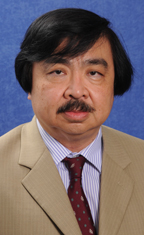Louis C. Chow to Receive the ASME Allan Kraus Thermal Management Medal
Louis C. Chow to Receive the ASME Allan Kraus Thermal Management Medal
 NEW YORK, October 22, 2012 —Louis C. Chow, Ph.D., a resident of Orlando, Fla., and associate dean for research in the College of Engineering and Computer Science (CECS) at the University of Central Florida (UCF), will be honored by ASME. He is being recognized for fundamental contributions to the field of evaporative spray cooling and the subsequent transition into enabling system-level technologies for the thermal management of high heat-flux electronic systems. He will receive ASME’s Allan Kraus Thermal Management Medal.
NEW YORK, October 22, 2012 —Louis C. Chow, Ph.D., a resident of Orlando, Fla., and associate dean for research in the College of Engineering and Computer Science (CECS) at the University of Central Florida (UCF), will be honored by ASME. He is being recognized for fundamental contributions to the field of evaporative spray cooling and the subsequent transition into enabling system-level technologies for the thermal management of high heat-flux electronic systems. He will receive ASME’s Allan Kraus Thermal Management Medal.
The medal, established in 2009, recognizes individuals who have demonstrated outstanding achievements in thermal management of electronic systems and their commitment to the field of thermal sciences. It will be presented to Dr. Chow during ASME’s 2012 International Mechanical Engineering Congress and Exposition, to be held in Houston, Nov. 9 through 15.
In addition to being associate dean for research in the CECS at UCF, Chow has held the university chair of mechanical engineering since 2002, and is also professor of optics and photonics.
Chow joined UCF in December 1995 as chair of the mechanical, materials and aerospace engineering department. During his tenure as chair (1995-2000), a master’s degree program in aerospace engineering, and master’s degree and Ph.D. degree programs in materials science and engineering were established. In addition, a new master’s track in miniature energy systems was created. He served as interim dean of CECS (2003-04) and was Lockheed Martin professor (2001-02).
Chow’s contributions to the field of thermal management include providing an understanding of the fundamental governing principles of evaporative spray cooling, developing solutions necessary to apply the technology and spawning several companies that have made the technology available in product form.
To date, Chow has graduated 22 Ph.D. students. Many of them hold senior positions in large corporations: one is director of a university research institute; two are CEOs of successful startup companies; and three are faculty members at U.S. universities. He and his research group have published four book chapters, 128 journal articles and 188 conference papers. Chow is also a co-inventor on 12 issued U.S. patents, with four additional ones pending.
An ASME Fellow, Chow is an associate editor of the Journal of Heat Transfer (2007-13). He has reviewed technical papers and organized sessions at a number of Society conferences.
Chow is an Associate Fellow of the American Institute of Aeronautics and Astronautics; and a member of the American Society for Engineering Education and the American Association for the Advancement of Science. His honors include a Washington State University Faculty Award (1982), University of Kentucky Faculty awards (1988-1991) and a UCF Research Incentive Award (2001).
Chow earned his three degrees from the University of California, Berkeley: a bachelor’s degree in physics (distinction in general scholarship) in 1972; and a master’s degree and Ph.D. in mechanical engineering in 1974 and 1978, respectively.
The ASME Foundation is the proud supporter of the ASME Honors and Awards program through the management of award endowment funds set up by individuals, corporations or groups.
About ASME ASME helps the global engineering community develop solutions to real world challenges. Founded in 1880 as the American Society of Mechanical Engineers, ASME is a not-for-profit professional organization that enables collaboration, knowledge sharing and skill development across all engineering disciplines, while promoting the vital role of the engineer in society. ASME codes and standards, publications, conferences, continuing education and professional development programs provide a foundation for advancing technical knowledge and a safer world. For more information visit www.asme.org.


